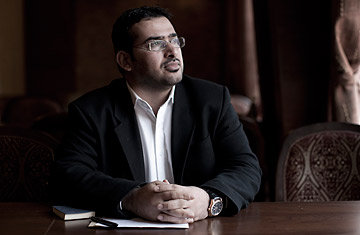
Muntazer al-Zaidi, in a cafe in Beirut.
When Hosni Mubarak issued his defiant — and, as it turned out, toothless — vow to remain in office, thousands of Egyptian protesters in Cairo responded by waving their shoes in the air. At that moment, Muntazer al-Zaidi, 32, allowed himself a small smile of satisfaction.
Brandishing shoes at someone is considered a grave affront in much of the Arab world, but Zaidi, an Iraqi journalist, famously took the art of footwear insults to a new level in December 2008 when he hurled a pair of his work shoes at the head of President George W. Bush during a press conference in Baghdad. "I wanted to send a message to the world, and I'm happy that the message was received," he tells TIME. That carefully planned one-man "day of anger" won him admirers around the globe and sparked a wave of copycat shoe-throwing from Canada to Sweden and from the U.K. to India.
For all the shoe leather, Zaidi was bundled out of the press conference by Iraqi security officers and thrown into jail, where he says he was beaten and tortured with electricity. For weeks, Zaidi was unaware of the international impact of his act of protest, as he was held in solitary confinement for three months in a cell measuring less than 5 sq. ft. Zaidi says his jailers told him that his action had been widely condemned and that he must apologize or face execution by hanging. "The [Iraqi] government inherited lying from Bush," he says. "I said, 'Hang me. I have nothing to lose.'"
After serving nine months of a yearlong prison sentence, he was released on good behavior and has lived in exile outside Iraq ever since.
But the uprisings in Tunisia and then Egypt have encouraged Iraqi activists to launch their own broad campaign to demand reform of the political system. Zaidi had planned to return to Iraq to participate in a mass rally scheduled for Feb. 25 in Baghdad's own Tahrir Square. But it's been reported that he was arrested on Thursday while attempting to hold a news conference in Baghdad. The planned demonstration, he promised, would overcome the sectarian and ethnic divisions that have plagued Iraqi society in recent years to draw Sunnis, Shi'ites, Christians, Arabs and Kurds. "We never used to have sectarianism until the Americans came to Iraq," he says.
Zaidi presently lives in Beirut, the Lebanese capital, where he works for a local television station and pens a weekly column for the pan-Arab Al-Quds al-Arabi newspaper. Dressed in a pristine white shirt and sporting a neatly trimmed stubbly beard, he sips from a glass of tea and smokes a hubble-bubble as he chats. On the table in front of him is a sheet of lined paper half-filled with neat handwritten Arabic script, his latest dispatch to his newspaper.
In December, Zaidi published a memoir, The Last Salute to President Bush, describing the shoe-throwing incident and the events leading up to it. The book is written in Arabic, but Zaidi hopes it will be picked up by a U.S. publisher and translated into English. "It will show the Americans what really happened in Iraq from the eye of a journalist and a citizen," he says.
In some respects, Zaidi epitomizes the new youthful generation of Arab activists who have overcome the pervasive fear that for years cowed their parents into submission before corrupt, venal and ossified police regimes. "The beliefs of our parents do not match the needs of our times," he says.
The stunning success of the antiregime protests in Tunisia and Egypt were sparked by years of injustice and frustration but were made possible by the media communications revolution, which Zaidi says, turns protests into "leaderless networks." "In the past, someone would call for a revolution and he would be arrested, and the revolution would end," Zaidi says. "But today, people can incite revolutions through Facebook, Twitter and messaging. The era of one leader is over. Now it's the people leading themselves."
He is no admirer of American foreign policy but admitted that the regular elections in the U.S. and the freedom to demonstrate in the West have drawn the envious eye of Arabs living under repressive regimes. "Young people watch the satellite-television stations and ask why Americans can elect new leaders every four years, but they cannot in their country," he says. "Today, the media are the mobilizer of revolutions."
Zaidi left Iraq after receiving multiple death threats, and he knows he is running a great risk by returning to Baghdad to take part in the planned demonstration. But he says any fears have been quashed by the encouraging personal messages he received from the protesters in Egypt and Tunisia. "They were saying that they were inspired by me personally to not be afraid," he says, barely able to hide a smile of pride. "We have worries, but fear is an obstacle to action. Besides, any revolution needs blood, the same as a car needs fuel."
